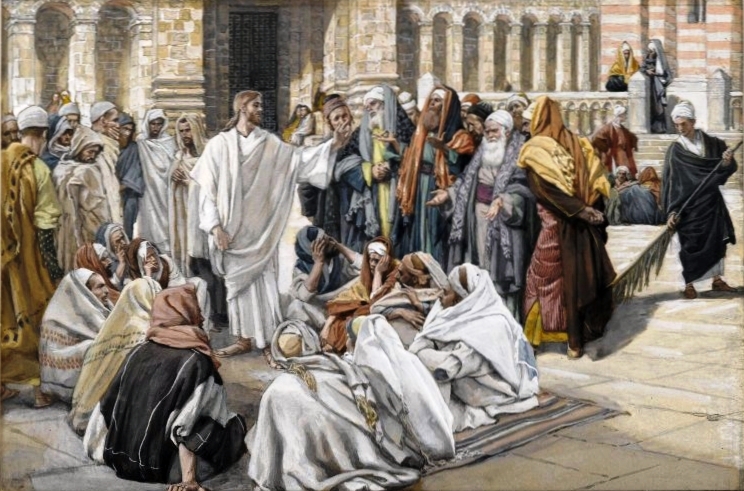Scripture Readings: Deut. 4:1-2, 6-9; Ps. 15; James 1:17-27; Mark 7:1-8, 14-15, 21-23 Sermon by Sheila Graham from Deuteronomy 4, Mark 7 and James 1 (drawing from the Expositor's Bible Commentary)
Embracing True Freedom
Introduction
According to popular legend, just over 500 years ago, on October 31, 1517, German priest and theologian Martin Luther defiantly nailed a copy of his 95 Theses to the door of the Wittenberg Castle church, sparking the Protestant Reformation.

For many years, Luther had tried hard to be righteous in order to avoid suffering God’s wrath. He fasted so often he permanently damaged his body; he caused himself physical pain by lashing himself. He kept the other priests busy with his constant confessions. He took the admonition to fear God very seriously. He was terrified of God and God’s punishment.
But then everything changed as the Spirit led Luther in a deep study of Scripture where he came to the realization that the righteousness he had been seeking was a gift of God’s grace. He learned that nothing he could do, no matter how rigorous, would achieve that righteousness. He went on to share far and wide his understanding that freedom from guilt and sin comes from Jesus Christ, not from obedience to any rule, practice, or law.
Through Luther’s writings, many people began to understand and embrace what true freedom in Jesus Christ means.
Freedom is not easy to understand
What Luther came to understand about freedom in Christ was not well-received. It is not an easy concept to understand. In Luther’s day and continuing down to our day, many religious leaders attach lots of rules and regulations to the simple gospel message of Jesus Christ.
Even in the first century, it was difficult for some of the early Christians to understand. Part of the reason was because many of them had come out of Judaism with its many laws and traditions (some of us can relate to that!). Let’s see why it was so difficult for them to understand and fully accept their freedom in Christ.
Look at how these people had been taught through the generations. Moses and the Law were their guides. Moses was dogmatic about obedience to the Law:
Israel, give heed to the statutes and ordinances that I am teaching you to observe, so that you may live to enter and occupy the land that the Lord, the God of your ancestors, is giving you. You must neither add anything to what I command you nor take away anything from it, but keep the commandments of the Lord your God with which I am charging you. (Deut. 4:1-2, NRSV)
Not only were the people of Israel to keep the Law in their lifetimes, the laws, commandments, statutes and ordinances that made up the Law of Moses were to be taught to their children as well, so they would be passed down through the generations to come. Look at verse 9:
Take care and watch yourselves closely, so as neither to forget the things that your eyes have seen nor to let them slip from your mind all the days of your life; make them known to your children and your children’s children… (Deut. 4:9, NRSV)
Jesus’ freedom is suspect to legalists
After being schooled from childhood in the Law, freedom in Christ was not easy for these early Jewish Christians to understand. Not only did they have the Law given by Moses, the Jewish religious leaders over the years had tacked on more laws, rules and traditions as well.
They made a point to closely watch Jesus and his followers to see if they were following all the rules and traditions. After all, how could these religious types measure and compare how righteous they were with others without all these rules to go by? They were quick to condemn. But Jesus saw right through their self-righteousness:
When the Pharisees and some of the scribes who had come from Jerusalem gathered around him, they noticed that some of his disciples were eating with defiled hands, that is, without washing them. (For the Pharisees, and all the Jews, do not eat unless they thoroughly wash their hands, thus observing the tradition of the elders; and they do not eat anything from the market unless they wash it; and there are also many other traditions that they observe, the washing of cups, pots, and bronze kettles.) So the Pharisees and the scribes asked him, “Why do your disciples not live according to the tradition of the elders, but eat with defiled hands?” (Mark 7:1-5, NRSV)

Jesus’ response
How did Christ respond? Not as they might have expected:
He said to them, “Isaiah prophesied rightly about you hypocrites, as it is written, ‘This people honors me with their lips, but their hearts are far from me; in vain do they worship me, teaching human precepts as doctrines.’ You abandon the commandment of God and hold to human tradition.” (Mark 7:6-8, NRSV)
Jesus called these religious leaders out for their hypocrisy. He knew their hearts. And he knew while they might carefully measure out a tithe of mint or cumin, they didn’t keep God’s commandments to love God and their neighbors.
Jesus didn’t just ignore what the Pharisees and scribes had said about ritual washings, either. He made a point to get the crowd’s attention and explain to them what really defiles a person:
Then he called the crowd again and said to them, “Listen to me, all of you, and understand: there is nothing outside a person that by going in can defile, but the things that come out are what defile…. For it is from within, from the human heart, that evil intentions come: fornication, theft, murder, adultery, avarice, wickedness, deceit, licentiousness, envy, slander, pride, folly. All these evil things come from within, and they defile a person.” (Mark 7:14-15, NRSV; Mark 7:21-23, NRSV)
Jesus enumerated what evil really consisted of—not what people eat or how they dress or wash or anything outside a person, but from the evil that comes from what Jesus refers to as the human heart. No amount of washing can cleanse that evil. The righteous live by faith in Christ and his sacrifice.
Freedom is by faith in Jesus, not works
In Romans and Galatians, the apostle Paul refers to Abraham as “the father of the faithful.” He cites Abraham’s example of the righteousness of faith—that’s the only response needed from us to Jesus’ sacrifice on the cross. This is a righteousness—a right relationship with God—which comes by faith alone, not by works of the law. Even that faith, by which we stand rightly related to God, is his gift through the ministry of the Holy Spirit.
Does that mean obedience to God is not necessary for Christians? No, we know better. That is not the freedom in Christ Paul was preaching.
Paul teaches there is an obedience to God that faith produces (In Romans 1, Paul calls it “the obedience that comes from faith”)—an obedience through the Spirit, grounded in faith in God and motivated by love for God, not fear. This obedience is about keeping Christ’s commands to love God and to love one another. It is our grateful response to God’s overwhelming love for us.
James also refers to this obedience that comes through faith. He calls it “the law of liberty.” He also calls it “the perfect law.” Why use those terms?Perhaps because James is wanting to be sure his readers don’t confuse Christ’s commandments to love God and one another with the old dos and don’ts of the Law of Moses. In like manner, Paul, in Romans 7, taught that though the Law of Moses was “holy,” is lacked something (Romans 7:12, 18-19). What was it lacking? Christ and his grace!
It’s also possible that James was combining the words law and liberty in order to show an overall picture of God’s truth as expounded throughout the Old and New Testaments. The old law was the teacher that led us to Jesus, but only by Christ’s free gift of grace can we be obedient to him, thus keeping his law of love. Notice what else James says:
Be doers of the word, and not merely hearers who deceive themselves. For if any are hearers of the word and not doers, they are like those who look at themselves in a mirror; for they look at themselves and, on going away, immediately forget what they were like. But those who look into the perfect law, the law of liberty, and persevere, being not hearers who forget but doers who act—they will be blessed in their doing.” (James 1:22-25, NRSV)
Conclusion
In summation, Jesus came to bring us truth, a truth that frees us from the old law and gives us his law of grace and liberty. Jesus said his truth makes us free. Let’s read what Jesus said about the freedom he gives:
Then Jesus said to the Jews who had believed in him, “If you continue in my word, you are truly my disciples; and you will know the truth, and the truth will make you free.” (John 8:31-32, NRSV)
But much like some today, they questioned the freedom that Christ offered. They didn’t realize they were in slavery to sin:
Jesus answered them, “Very truly, I tell you, everyone who commits sin is a slave to sin. The slave does not have a permanent place in the household; the son has a place there forever. So if the Son makes you free, you will be free indeed.” (John 8:34-36, NRSV)
Jesus was talking about a different type of slavery, the kind that any of us can be and have been a slave to. Only through the love, sacrifice and forgiveness of Jesus are we set free from sin.
When he freed us from sin, Jesus made us free to be who we truly are in him. We can quit being like the Pharisees by trying to look and act “religious.” We can admit we still make mistakes, and yet have the full confidence that Jesus forgives us and loves us anyway. And, you know what? When we realize we’re not all that perfect, we’ll be less likely to judge others, and as a result, they will feel more comfortable around us.
Knowing that God loves us and forgives us, we’re free to bear fruit for God. Free to love God and to love others. Free to be, as James says, Christian doers, not just hearers. Christians who recognize they are not perfect, and who can focus on others and their needs instead of their own shortcomings. How can people not like that?
When people feel you like them and don’t judge them, they are comfortable around you. That gives you the opportunity to show God’s love to them. When Jesus says he has made us free, he means it. The shackles are removed. Our sins are forgiven. We are free indeed. That’s an amazing truth we can share with others.



amen!!!!
Very inspiring message